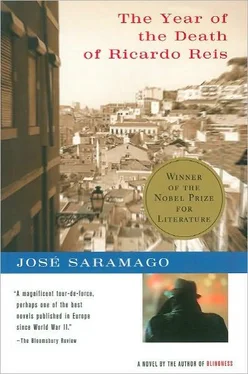José Saramago - Year of the Death of Ricardo Reis
Здесь есть возможность читать онлайн «José Saramago - Year of the Death of Ricardo Reis» весь текст электронной книги совершенно бесплатно (целиком полную версию без сокращений). В некоторых случаях можно слушать аудио, скачать через торрент в формате fb2 и присутствует краткое содержание. Год выпуска: 1992, ISBN: 1992, Издательство: Houghton Mifflin Harcourt, Жанр: Современная проза, на английском языке. Описание произведения, (предисловие) а так же отзывы посетителей доступны на портале библиотеки ЛибКат.
- Название:Year of the Death of Ricardo Reis
- Автор:
- Издательство:Houghton Mifflin Harcourt
- Жанр:
- Год:1992
- ISBN:9780547546926
- Рейтинг книги:4 / 5. Голосов: 1
-
Избранное:Добавить в избранное
- Отзывы:
-
Ваша оценка:
- 80
- 1
- 2
- 3
- 4
- 5
Year of the Death of Ricardo Reis: краткое содержание, описание и аннотация
Предлагаем к чтению аннотацию, описание, краткое содержание или предисловие (зависит от того, что написал сам автор книги «Year of the Death of Ricardo Reis»). Если вы не нашли необходимую информацию о книге — напишите в комментариях, мы постараемся отыскать её.
Year of the Death of Ricardo Reis — читать онлайн бесплатно полную книгу (весь текст) целиком
Ниже представлен текст книги, разбитый по страницам. Система сохранения места последней прочитанной страницы, позволяет с удобством читать онлайн бесплатно книгу «Year of the Death of Ricardo Reis», без необходимости каждый раз заново искать на чём Вы остановились. Поставьте закладку, и сможете в любой момент перейти на страницу, на которой закончили чтение.
Интервал:
Закладка:
Things did not come to that pass, perhaps because the threat had been nothing but bravado, perhaps because two armed policemen were patrolling the neighborhood, a symbol of protection which would have proved ineffectual if the troublemakers had gone ahead with their gruesome plan, but when all is said and done, the presence of the law commands some respect. Ricardo Reis appeared discreetly before the funeral cortege was due to set off, he watched from a distance as he had been advised, having no desire to find himself in the midst of a sudden riot, and was amazed at the hundreds of people cramming into the street in front of the morgue, just like the charity day organized by O'Século, were it not for all those women dressed in garish red, their skirts, blouses, shawls, and their youths in suits of the same color, a most unusual expression of mourning if these are friends of the deceased, and a blatant provocation if they are his enemies. This looks more like a carnival parade. Now the bier comes into sight, drapes flapping as it heads for the cemetery, drawn by two mares with plumes and trappings, and two policemen march, one on either side of the coffin, a guard of honor for O Mouraria, these are the ironies of fate, who would have imagined it. There go the military policemen with their swords knocking against their legs and their holsters unbuttoned, and the mourners wail and sob, those dressed in red making as much noise as those in black, the latter for the dead man being carried to his grave, the former for his assassin locked up in jail. Lots of people barefoot and covered with rags. Some women, dressed in all their finery and wearing gold bracelets, walk arm in arm with their menfolk, the latter have black sideburns and clean-shaven faces still blue from the razor, they look around them with suspicion, other women shout insults, their bodies sway at the hips, but however sincere or false their sentiments all the people show a kind of ferocious gaiety which has brought friends and enemies together. This tribe of criminals, pimps, whores, pickpockets, and burglars fences the black horde that marches across the city. Windows open to watch them file past. The courtyard of the miracles, reminiscent of Victor Hugo's Notre Dame de Paris, has emptied, and the residents tremble with fear, because the thief who will enter their house tomorrow might be out there. Look, Mummy, the children shout, but for children everything is one big celebration. Ricardo Reis accompanied the funeral cortege as far as the Pa$o da Rainha. Women began to cast furtive glances at the well-dressed gentleman, Who can he be, this is feminine curiosity, natural in those who spend their life sizing up men. The cortege disappeared around a corner, almost certainly heading toward the Alto de Sao Joáo, unless it took another turn farther on, to the left, in the direction of Benfica, it was definitely not heading toward the Cemetery of Prazeres, and what a pity, for we are losing an edifying example of the equality bestowed by death, O Mouraria lying side by side with Fernando Pessoa. What conversations would those two have under the shade of the cypress trees as they watched the ships enter the harbor on sultry afternoons, the one explaining to the other how words must be juggled in order to pull off a confidence game or pull off a poem. That same evening, as he served the soup, Ramón explained to Doctor Ricardo Reis that the red garments indicated neither mourning nor disrespect, rather it was a custom peculiar to the neighborhood, whose inhabitants donned red for all special occasions. The tradition existed before he arrived from Galicia, and he learned about it from others. Did you catch sight of a very striking woman at the funeral, tall, dark eyes, dressed in fine clothes, wearing a stole made of soft merino wool. My dear fellow, there were so many women in the crowd, hundreds of them, who was she. The lover of O Mouraria, a singer. No, I didn't notice her. Such a beauty and what a voice, it will be interesting to see who grabs her now. It's not likely to be me, Ramón, and I don't think it will be you either. That I should be so lucky, Doctor, that I should be so lucky, but that kind of woman costs money. This is just talk, wishful thinking, a fellow has to say something, does he not, but as for the red garments, I believe the custom goes back to the time of the Moors, the devil's weeds, nothing to do with Christianity. When Ramón came back later to remove his plate, he asked Ricardo Reis what he thought about the news arriving from Spain as the elections drew near, and who in his opinion would win, The outcome won't affect me, I am doing all right here, but I'm thinking about my father back in Galicia, where I still have some relatives, although most of them have emigrated. To Portugal. All over the world, in a manner of speaking, between brothers, nephews, and cousins my family is scattered throughout Cuba, Brazil, and Argentina, I even have a godson in Chile. Ricardo Reis told him what he knew from press reports, the right-wing parties were expected to win, and Gil Robles had said, You know who Gil Robles is, I've heard the name, Well, he said that when he comes to power he will abolish Marxism and the class struggle and establish social justice. Do you know what Marxism is, Ramón, No I don't, Doctor, And the class struggle, No, And social justice, I've never had any dealings with the law, thanks be to God. Well, within the next few days we will know who has won, probably nothing will change, Better the devil you know, as my grandfather used to say, Your grandfather was right, Ramón, your grandfather was a clever man.
Whether he was or not, the left won. The following morning the newspapers reported that at first it looked as if the right had won in seventeen provinces, but when all the votes were counted, it became apparent that the left had elected more deputies than the center and right put together. Rumors were already circulating that a military coup was being planned with the connivance of Generals Goded and Franco, but these were being denied. President Alcalá Zamora entrusted Azaña with the task of forming a government. Let's see what this will bring, Ramón, whether it will be good or bad for Galicia. Here, walking in these streets, one sees grim faces, but a few dissimulate, if that gleam in their eye is not one of satisfaction, you could have fooled me. Here in the last sentence does not mean all of Lisbon let alone all Portugal, who knows what is happening in the rest of the country, Here means only the thirty streets located between the Cais do Sodré and Sao Pedro de Alcântara and between the Rossio and Calhariz, like an inner city surrounded by invisible walls that protect it from an invisible siege. The besieged and besiegers coexist, each side refers to the other as They, because the two are different, mutually foreign, they eye each other with suspicion, one side craves more power, the other side finds its strength insufficient. The wind blowing from Spain, what will it bring us, what nuptials. Fernando Pessoa replied, Communism, it won't be long in coming. Ironically he added, Hard luck, my dear Reis, you fled from Brazil in order to live the rest of your days in peace, and the next thing you know our neighbor, Spain, is in turmoil, soon they will invade us. How often do I have to tell you that if I came back, it was because of you. You still haven't convinced me. I'm not trying to convince you, all I ask is that you spare me your views on this matter. Don't be angry with me. I lived in Brazil, now I'm here in Portugal, I have to live somewhere, when you were alive you were sufficiently intelligent to understand this and more. This is the drama, my dear Reis, one has to live somewhere, for there is nowhere that is not somewhere and life cannot be other than life, at long last I am becoming aware of this, the greatest evil of all is that a man can never reach the horizon before his eyes, and the ship in which we do not sail, we would have that be the ship of our voyage, Ah, the entire quay, a memory carved in stone. And now that we have yielded to sentiment and started quoting verses, here is a line by Alvaro de Campos, who someday will achieve the recognition he deserves, Console yourself in the arms of Lydia, if your love endures , and remember that that too was denied me. Good-night, Fernando, Good-night, Ricardo. Carnival will soon be here, enjoy yourself but don't expect to see me for the next few days. They had met in a local café, half a dozen tables, no one there knew them. Fernando Pessoa came back and sat down again, I've just had an idea, why don't you dress up as a horse trainer, high boots and riding breeches, a red jacket with braiding, Red, Yes, red is just the color, and I will dress as death, in black mesh with bones painted on it, you cracking your whip and I scaring the old women, I'll carry you off, I'll carry you off, and fondling the young girls as we go, at a masked ball we would easily win first prize. I've never been one for dancing, There's no need, the crowd would only have ears for your whip and eyes for my bones, Don't you think we're both a little old for such games, Speak for yourself, I've stopped being any age. With these words Fernando Pessoa got to his feet and departed. It was raining outside and the waiter behind the bar said, Without a raincoat or umbrella that friend of yours is going to get a soaking. He doesn't mind, he's accustomed to it.
Читать дальшеИнтервал:
Закладка:
Похожие книги на «Year of the Death of Ricardo Reis»
Представляем Вашему вниманию похожие книги на «Year of the Death of Ricardo Reis» списком для выбора. Мы отобрали схожую по названию и смыслу литературу в надежде предоставить читателям больше вариантов отыскать новые, интересные, ещё непрочитанные произведения.
Обсуждение, отзывы о книге «Year of the Death of Ricardo Reis» и просто собственные мнения читателей. Оставьте ваши комментарии, напишите, что Вы думаете о произведении, его смысле или главных героях. Укажите что конкретно понравилось, а что нет, и почему Вы так считаете.












